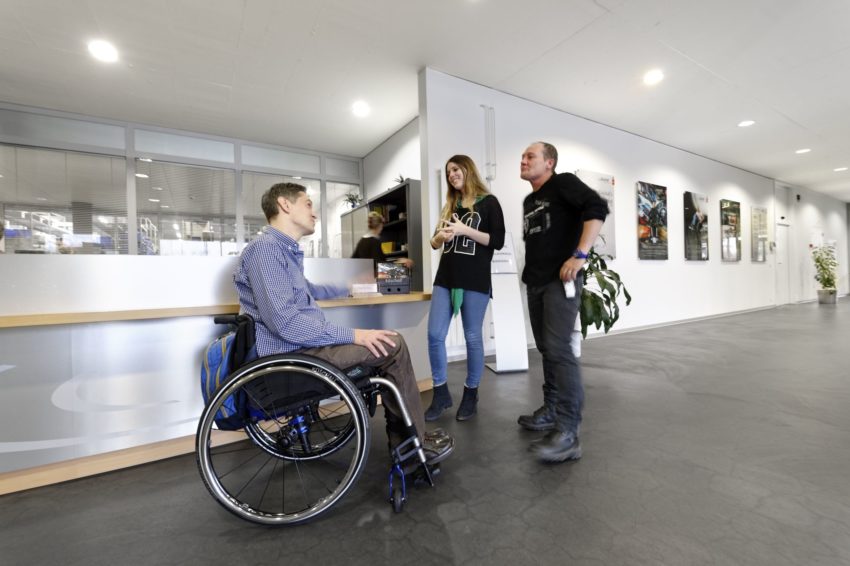If you’re a disabled person and you have a job, you may have come across a number of scenarios that have left you feeling a little baffled and possibly a little aggrieved.
Much like in everyday forms of life, disabled people often find themselves up against the elements and fighting just to be heard.
Finding employment is often hard enough when you’re a person with a disability. It’s especially true if you’re a wheelchair user – due to always unspoken, but often felt discrimination and job opportunities marred by inaccessible workplaces. So, when you do finally land yourself that perfect job, it’s infuriating to think that sometimes the problems don’t stop there.
Here are five examples of things all wheelchair users would probably hate within the workplace. Hopefully none of these things happen to you, but remember that these points are subjective – what might be annoying to you, may not be annoying to someone else. This article is designed just as a fun rundown of workplace mishaps and blunderous possibilities.
Employers assuming you’ll take a lot of sick leave
This is one point which can often prevent a disabled employee from even landing the job in the first place. For some reason, employers sometimes see a disabled individual and instantly assume that that person needs a lot of medical care and will therefore likely be requesting time off work on a regular basis for hospital appointments and medical care.
You should never judge, you should never assume.
It is not just terribly incorrect to think that all disabled individuals have complex care needs, it’s discriminatory. And if someone is carrying these assumptions towards their disabled work colleague or their employee, then this will most likely be highly aggravating for the disabled person. It would be aggravating for anyone.
Inappropriate desk height
If you’re a wheelchair user and you have an office job, or at least a job which requires you to work at a desk, there’s nothing more annoying than arriving at work and finding that your desk is at an inappropriate height and is uncomfortable – or even impossible – for you to work in your wheelchair. Inappropriate desk height really can make simple tasks tedious, tiring or outright impossible for wheelchair users. This is something which can easily be avoided or remedied – there are many adjustable desks available out there, on the market. Besides, desk height is not something that can be an issue only for disabled people – it’s also an issue if you’re tall, or short. Either way, it’s so much better to have these inclusive office fittings. For all people, not just disabled workers or wheelchair users.
Cluttered walkways through the office
There’s something seriously and quite specifically irritating about staff members that leave items lying around the workplace floor, especially if the walkways are narrow. Besides being an obvious fire hazard, and generally jeopardising the health and safety of all workers should there be a need for hasty evacuation, cluttered walkways can obstruct a wheelchair user not just in those unwelcomed situations, but also in everyday workplace tasks, be they job related or personal, like getting to the toilet. It actually goes without saying that pathways should be clear within the workplace to ensure free flowing movement for all disabled and non-disabled members of staff alike. It’s common logic, right?
Staff members crouching down to talk to you
It’s widely acknowledged, at least in the disabled community, that crouching down to speak to someone who is a wheelchair user is not the proper way of going about such things. So, you can probably imagine how much of an annoyance for a wheelchair user it is within a professional setting, when members of staff think it’s desirable to bend down on their haunches and chat with them on eye level. It may seem appropriate, friendly or a right thing to do, but for most people with a disability who are using a wheelchair this feels patronising and should never happen, anywhere. And especially not in a workplace.
People thinking you can’t handle big work loads
It’s amazing – well, it’s actually baffling, to be honest – what kind of things some people can assume when they see someone with a disability. Not wanting to burden a disabled person with a huge workload may be a thought which crosses the minds of many people in the working environment, and this thought is probably backed by good motives, people mean well. But they shouldn’t assume people automatically require their workload to be lessened just because they have a disability, or they use a wheelchair. This kind of assumption again acts as a form of patronising behaviour, and it’s discriminatory as well. You should treat all members of staff equally, and if a adisabled person – be they a wheelchair user or not – needs to complete a big task at work, let them cope with it! Failure is a part of life whether you live with a disability or not, and a feeling of achievement after beating a challenge is something we all can enjoy. As a matter of fact, folks with disabilities know a thing or two about challenges, and they often thrive despite being surrounded by them.
If you’ve had any negative – or positive – experiences as a wheelchair user within the workplace, find us on social media and tell us all about it – and if you’d like more articles like this, such as: Disability & Employment: Staying in Work, and what to do if Circumstances change – then feel free to check out the Passionate People blog site from Invacare!
